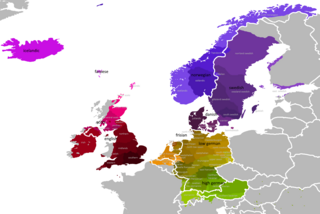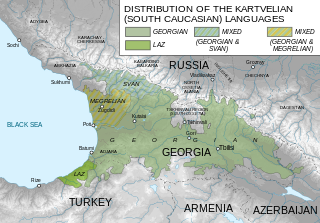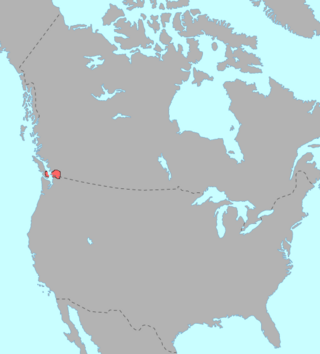Related Research Articles

Khmer is an Austroasiatic language spoken by the Khmer people, and the official and national language of Cambodia. Khmer has been influenced considerably by Sanskrit and Pali, especially in the royal and religious registers, through Hinduism and Buddhism. It is also the earliest recorded and earliest written language of the Mon–Khmer family, predating Mon and Vietnamese, due to Old Khmer being the language of the historical empires of Chenla, Angkor and, presumably, their earlier predecessor state, Funan.

The Germanic languages are a branch of the Indo-European language family spoken natively by a population of about 515 million people mainly in Europe, North America, Oceania and Southern Africa. The most widely spoken Germanic language, English, is also the world's most widely spoken language with an estimated 2 billion speakers. All Germanic languages are derived from Proto-Germanic, spoken in Iron Age Scandinavia and Germany.

Georgian is the most widely spoken Kartvelian language; it also serves as the literary language or lingua franca for speakers of related languages. It is the official language of Georgia and the native or primary language of 87.6% of its population. Its speakers today amount to approximately 3.76 million. Georgian is written in its own unique alphabet.

Zarma is one of the Songhay languages. It is the leading indigenous language of the southwestern lobe of the West African nation of Niger, where the Niger River flows and the capital city, Niamey, is located. Zarma is the second-most common language in the country, after Hausa, which is spoken in south-central Niger. With over 6 million speakers, Zarma is easily the most widely spoken Songhay language.

Northern or North Sámi is the most widely spoken of all Sámi languages. The area where Northern Sámi is spoken covers the northern parts of Norway, Sweden and Finland. The number of Northern Sámi speakers is estimated to be somewhere between 15,000 and 25,000. About 2,000 of these live in Finland and between 5,000 and 6,000 in Sweden, with the remaining portions being in Norway.

Halkomelem is a language of various First Nations peoples of the British Columbia Coast. It is spoken in what is now British Columbia, ranging from southeastern Vancouver Island from the west shore of Saanich Inlet northward beyond Gabriola Island and Nanaimo to Nanoose Bay and including the Lower Mainland from the Fraser River Delta upriver to Harrison Lake and the lower boundary of the Fraser Canyon.
In the phonology of the Romanian language, the phoneme inventory consists of seven vowels, two or four semivowels, and twenty consonants. In addition, as with other languages, other phonemes can occur occasionally in interjections or recent borrowings.
Stress is a prominent feature of the English language, both at the level of the word (lexical stress) and at the level of the phrase or sentence (prosodic stress). Absence of stress on a syllable, or on a word in some cases, is frequently associated in English with vowel reduction – many such syllables are pronounced with a centralized vowel (schwa) or with certain other vowels that are described as being "reduced". Various phonological analyses exist for these phenomena.
In phonology, apocope is the loss (elision) of a word-final vowel. In a broader sense, it can refer to the loss of any final sound from a word.

The Wariʼ language is the sole remaining vibrant language of the Chapacuran language family of the Brazilian–Bolivian border region of the Amazon. It has about 2,700 speakers, also called Wariʼ, who live along tributaries of the Pacaas Novos river in Western Brazil. The word wariʼ means "we!" in the Wariʼ language and is the term given to the language and tribe by its speakers.
The Ojibwe language is an Algonquian North American indigenous language spoken throughout the Great Lakes region and westward onto the northern plains. It is one of the largest indigenous language north of Mexico in terms of number of speakers, and exhibits a large number of divergent dialects. For the most part, this article describes the Minnesota variety of the Southwestern dialect. The orthography used is the Fiero Double-Vowel System.

Portuguese orthography is based on the Latin alphabet and makes use of the acute accent, the circumflex accent, the grave accent, the tilde, and the cedilla to denote stress, vowel height, nasalization, and other sound changes. The diaeresis was abolished by the last Orthography Agreement. Accented letters and digraphs are not counted as separate characters for collation purposes.

A heteronym is a word that has a different pronunciation and meaning from another word but the same spelling. These are homographs that are not homophones. Thus, lead and lead are heteronyms, but mean (average) and mean (intend) are not, since they are pronounced the same. Heteronym pronunciation may vary in vowel realisation, in stress pattern, or in other ways.
The phonology of Turkish deals with current phonology and phonetics, particularly of Istanbul Turkish. A notable feature of the phonology of Turkish is a system of vowel harmony that causes vowels in most words to be either front or back and either rounded or unrounded. Velar stop consonants have palatal allophones before front vowels.
Southern Oromo, or Borana, is a variety of Oromo spoken in southern Ethiopia and northern Kenya by the Borana people. Günther Schlee also notes that it is the native language of a number of related peoples, such as the Sakuye.

Maliseet-Passamaquoddy is an endangered Algonquian language spoken by the Maliseet and Passamaquoddy peoples along both sides of the border between Maine in the United States and New Brunswick, Canada. The language consists of two major dialects: Maliseet, which is mainly spoken in the Saint John River Valley in New Brunswick; and Passamaquoddy, spoken mostly in the St. Croix River Valley of eastern Maine. However, the two dialects differ only slightly, mainly in their phonology. The indigenous people widely spoke Maliseet-Passamaquoddy in these areas until around the post-World War II era when changes in the education system and increased marriage outside of the speech community caused a large decrease in the number of children who learned or regularly used the language. As a result, in both Canada and the U.S. today, there are only 600 speakers of both dialects, and most speakers are older adults. Although the majority of younger people cannot speak the language, there is growing interest in teaching the language in community classes and in some schools.

Ute is a dialect of the Colorado River Numic language, spoken by the Ute people. Speakers primarily live on three reservations: Uintah-Ouray in northeastern Utah, Southern Ute in southwestern Colorado, and Ute Mountain in southwestern Colorado and southeastern Utah. Ute is part of the Numic branch of the Uto-Aztecan language family. Other dialects in this dialect chain are Chemehuevi and Southern Paiute. As of 2010, there were 1,640 speakers combined of all three dialects Colorado River Numic. Ute's parent language, Colorado River Numic, is classified as a threatened language, although there are tribally-sponsored language revitalization programs for the dialect.
Grass Koiari (Koiali) is a Papuan language of Papua New Guinea spoken in the inland Port Moresby area. It is not very close to the other language which shares its name, Mountain Koiali. It is considered a threatened language.
Wamesa is an Austronesian language of Indonesian New Guinea, spoken across the neck of the Doberai Peninsula or Bird's Head. There are currently 5,000–8,000 speakers. While it was historically used as a lingua franca, it is currently considered an under-documented, endangered language. This means that fewer and fewer children have an active command of Wamesa. Instead, Papuan Malay has become increasingly dominant in the area.
References
- ↑ Lahiri, Aditi; Thomas Riad; Haike Jacobs (1999). "Diachronic prosody". In Harry van der Hulst (ed.). Word Prosodic Systems in the Languages of Europe. Typology of Languages in Europe. Berlin: Walter de Gruyter. p. § 6.7 Romance Loans : p.375–6. ISBN 3-11-015750-0.
noun-verb stress alternation occurred only in the beginning of the modern period
- ↑ Spencer, Andrew (1998). "Morphological Operations". In Andrew Spencer & Arnold Zwicky (ed.). The Handbook of Morphology. Blackwell. p. § 3.4: Stress; p.134. ISBN 0-631-22694-X.
- ↑ "Conscript | Define Conscript at Dictionary.com". Dictionary.com. Retrieved June 1, 2017.
- ↑ "Construct | Define Construct at Dictionary.com". Dictionary.com. Retrieved June 1, 2017.
- ↑ "Contest | Define Contest at Dictionary.com". Dictionary.com. Retrieved June 1, 2017.
- ↑ "se·crete2". American Heritage Dictionary (4th ed.). Yahoo! . Retrieved 4 February 2014.
- ↑ Pilch, Herbert (1988). "Lexical Indeterminacy". In E.G. Stanley; T.F. Hoad (eds.). Words: For Robert Burchfield's Sixty-Fifth Birthday. D.S. Brewer. §4: disyllabic nouns with different stress; p.148. ISBN 0-85991-259-0.
- ↑ Kriman, Alfred M. "SBF Glossary : P/U, PU". Stammtisch Beau Fleuve. Retrieved 2007-11-19.